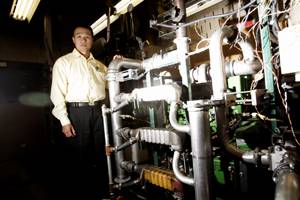Professor works to improve internal combustion engine’s efficiency

Song-Charng Kong, PhD and assistant professor in mechanical engineering, displays his diesel engine laboratory in Black Engineering on Fri, Sept. 26, 2008. Since coming to Iowa State three years ago, Professor Kong’s research has focused on lowering emissions and increasing efficiency for diesel engine combustion. Photo: Kevin Zenz/Iowa State Daily
October 1, 2008
Iowa State researchers are working to develop a better engine.
Song-Charng Kong, assistant professor of mechanical engineering, has been studying the internal combustion engine for the last couple of years in hopes of gradually improving its efficiency.
Kong said his research falls into two categories: working to improve engine efficiency and testing different kinds of biodiesel.
He said since the government has regulations about engine emissions, he and the others working with him want to find ways to keep emissions low for internal combustion engines.
John Deere is sponsoring Kong’s research about engine efficiency, he said.
“We have several John Deere engines in our laboratory,” he said. “We use these engines to see how we can improve the engine efficiency and also improve the emissions at the same time.”
One way Kong said he is working to reduce emissions is to implement a new fuel injection system.
This new system, Kong said, will help lower emissions because it will help control the actual combustion process.
“[If] you can control the combustion, you can control the emissions,” Kong said.
Fuel injection is part of an engine’s system, Kong said, so changing fuel injection is changing an important part of the engine.
Eventually, Kong said he and the other researchers will submit the results and ideas from their research to John Deere, where they may influence the company’s engine designs.
Terry Meyer, assistant professor of mechanical engineering, is helping Kong look at what he described as the “spray and combustion process,” as well as helping to test alternative fuels.
The “spray” is another word for fuel injection. Meyer said the design of the spray will determine where the fuel ends up in the chamber, and that, in turn, will control how the combustion process proceeds.
Forcing the liquid fuel into the chamber at a very high rate, Meyer said, will break the liquid into smaller droplets.
“You want to do this so it has an easier chance of evaporating so that it can then mix with the air [in the engine chamber] and then combust,” Meyer said.
Meyer said the research that consists of testing biodiesel fuels isn’t targeted at any specific kind of engine, but more at “developing an understanding at how these fuels would behave in a generic diesel engine.”
Meyer said an important aspect of researching combustion is being able to visualize the combustion process.
He said he and Kong and the other researchers have what is called a “constant volume combustion chamber,” which is a chamber that can simulate conditions in a diesel engine. This chamber allows the researchers to see the combustion process.
Kong said while the final goal of the project is to improve engine efficiency, it will take some small steps to get there.
“We can only try to do some implemental improvements,” Kong said.
















